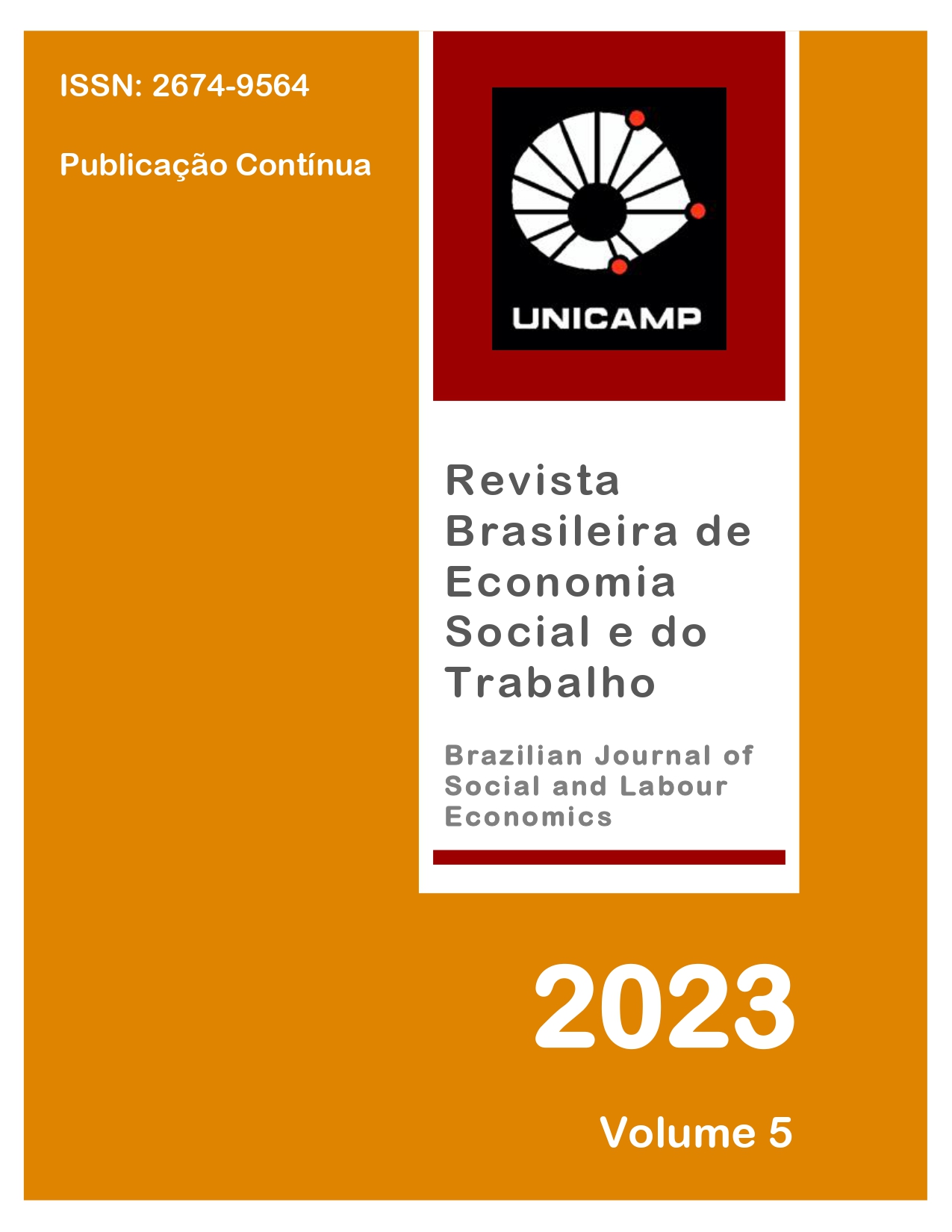Abstract
The Brazilian labor market experienced important changes in the 2010s. Between 2004 and 2014, there was an increase in formal employment, a reduction in informality, wage growth and an improvement in income distribution. These trends suffered an inflection point caused by the sharp economic recession of 2015-2016. The 2017 labor reform amplified the destructive effects on the labor market that began with the economic crisis. In addition, the process of deindustrialization intensified, the services sector's share of GDP grew and dependence on commodity exports increased, which had an impact on the structure of employment and wages. This study analyzed the main changes in the economic structure of the state of São Paulo and their impact on the job market between 2012 and 2020. The advance of the services sector in generating jobs and the reduction of employment in industry were evident. Formal employment fell and self-employment grew. In addition, the proportion of people in the older age groups and those with more years of schooling increased.
References
Baltar, P., & Krein, J. D. (2013). A retomada do desenvolvimento e a regulação do mercado de trabalho no Brasil. Caderno CRH, 26(68), 273–292. https://doi.org/10.1590/S0103-49792013000200005
Baltar, P., & Leone, E. T. (2021). O avanço das formas de contratação flexíveis. In J. D. Krein et al. (Orgs.), O trabalho pós-reforma trabalhista (Vol. 1, pp. 78-113). Centro de Estudos Sindicais e de Economia do Trabalho (CESIT), UNICAMP.
Cacciamali, M. C., & Tatei, F. (2016). Mercado de trabalho: da euforia do ciclo expansivo e de inclusão social à frustração da recessão econômica. Estudos Avançados, 30(87), 103–121. https://doi.org/10.1590/S0103-40142016.30870007
Cano, W. (1998) Desequilíbrios regionais e concentração industrial no Brasil: 1930-1995 (2a ed.). Instituto de Economia da UNICAMP.
Cano, W. (2007). Raízes da concentração industrial em São Paulo (5a ed.). Instituto de Economia da UNICAMP.
Krein, J. D. (2018). O desmonte dos direitos, as novas configurações do trabalho e o esvaziamento da ação coletiva: consequências da reforma trabalhista. Tempo Social, 30(1), 77–104. https://doi.org/10.11606/0103-2070.ts.2018.138082
Krein, J. D., & Manzano, M. F. (2014). Notas sobre formalização. [Estudo de Caso: Brasil], Forlac – Programa de formalização na América Latina e no Caribe. Escritório Regional da OIT para a América Latina e o Caribe. http://www.ilo.org/wcmsp5/groups/public/---americas/---ro lima/documents/publication/wcms_245624.pdf
Macedo, F. C. de, & Porto, L. R. (2020). Um olhar territorial para o mercado de trabalho no Brasil (2002-2018). Boletim Regional, Urbano e Ambiental, IPEA, (24), 29–37. https://repositorio.ipea.gov.br/bitstream/11058/10677/1/brua_24_ensaio_economia_regional_art_3.pdf
Mattos, F. (2015). Avanços e dificuldades para o mercado de trabalho. Estudos Avançados, 29(85), 69–85. https://doi.org/10.1590/S0103-40142015008500006
Oliveira, T. (2017). Trabalho e padrão de desenvolvimento: uma reflexão sobre a reconfiguração do mercado de trabalho brasileiro. Hucitec.
Pochmann, M. (2020). Tendências estruturais do mundo do trabalho no Brasil. Ciência & Saúde Coletiva, 25(1), 89–99. https://doi.org/10.1590/1413-81232020251.29562019
Proni, M. W., & Gomes, D. C. (2019). Problemas crônicos do mercado de trabalho no Brasil: diferenças regionais, 2014-2019. In E. T. Leone & M. W. Proni (Orgs.), Facetas do trabalho no Brasil contemporâneo (pp. 21-36). CRV. https://www.eco.unicamp.br/images/publicacoes/Livros/centros-e-nucleos/facetas_do_trabalho_no_brasil_contemporaneo.pdf

This work is licensed under a Creative Commons Attribution-NonCommercial-ShareAlike 4.0 International License.
Copyright (c) 2023 Miguel Huertas Neto


